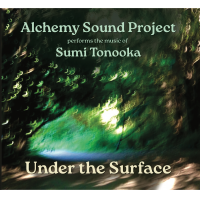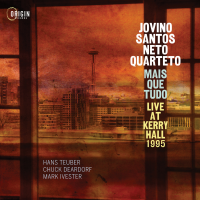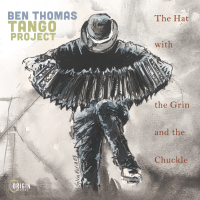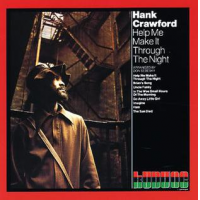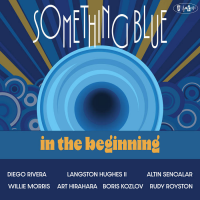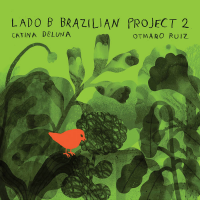Home » Jazz Articles » Liner Notes » Larry Coryell: Improvisations: Best of the Vanguard Years
Larry Coryell: Improvisations: Best of the Vanguard Years
Over the course of a winding, unpredictable career, Coryell has made his way through a myriad of musical directions and defied easy categorization. He has played, fat hollowbody guitar in hands, in the straight-ahead jazz vein of his early heroes, like

Tal Farlow
guitar1921 - 1998

Johnny Smith
guitar1922 - 2013

Emily Remler
guitar1957 - 1990
And not incidentally, in the tender, thunderous seminal days of his guitaristic explorations, Coryell was a man born to embrace the thing they called fusion. In fact, he arrived at the merger of jazz and rock before the f-word slipped into the cultural discussion, and marketplace. The native of Galveston, Texas, who came of age in Washington and studied journalism before succumbing to his love for the guitar, was already mixing up styles in 1966, in the aptly-named band, The Free Spirits.
As a sideman, too, Coryell brought a free spirit, regarding the blend of jazz and rock, in work with

Chico Hamilton
drums1921 - 2013

Herbie Mann
flute1930 - 2003

Gary Burton
vibraphoneb.1943

Tony Williams
drums1945 - 1997

John McLaughlin
guitarb.1942
Rock and roll, especially the sort which embraced an expansive view of music's possibilities—i.e. Hendrix and Cream—was, in Coryell's view, a friendly co-conspirator in the musical scheme of things. As the '60s melted into the '70s, Coryell had stoked his interest in rock as much as other, more complex musical issues, and had wound up sharing the stage with Jack Bruce and Mitch Mitchell.
By the early '70s, Coryell was always the maverick making eloquent mutterings in the corner of the jazz-rock scene. Names like

Mahavishnu Orchestra
band / ensemble / orchestrab.1971

Return to Forever
band / ensemble / orchestra
Weather Report
band / ensemble / orchestra1970's Spaces is something of a landmark not only in Coryell's career, but in the rapidly advancing evolution of jazz-rock. It was a cerebral all-star meeting of fusion architects, musicians who would go on to play in the primary ensembles of the idiom: John McLaughlin and

Billy Cobham
drumsb.1944

Chick Corea
piano1941 - 2021

Miroslav Vitous
bassb.1947

Bireli Lagrene
guitarb.1966
At the time of the original, though, some cultural chemistry experiment was underway, that even the players involved didn't quite yet understand. The title track, written by Julie Coryell, opens spaciously, with Vitous' ethereal arco bass tones. In the driving middle section comes the anxious fretboard dialogue between Coryell and McLaughlin—mutual admirers who would play together a decade later in an unplugged super-trio with

Paco de Lucia
guitar1947 - 2014
By the time Introducing the Eleventh House came out, fusion was in full swing, and listeners were attuned to its syntax of funk-driven rhythms, odd metered passages, and elaborate musical structures that defied the typical head-solo-head orthodoxy of jazz tradition. The Eleventh House, with a young

Randy Brecker
trumpetb.1945

Alphonse Mouzon
drums1948 - 2016
"Low Low Tah," with its rippling arpeggios over clenched, bittersweetly dissonant chords, its odd metric design and simple melody stated by Brecker, stakes out a Mahavishnu-esque musical place, but with distinct differences. Brecker's solo is followed by a thin-toned guitar solo with liberal bending of strings, a Hindi blues feel. A more chugging, accessible quality emerges on "Adam Smasher," with chord changes lifted from the pop world mixed in with jagged unison lines, and Mandel's archival analog synth sounds appearing like an endearing ancestor of the digital parade to come.
Mandel's "Joy Ride," vis a vis the title, is a breezy vamp, with a blithe, ornate little melody and the kind of rock-ish chord progression that lays easily under Coryell's spirited solo, again with a thin, rock guitar tone instead of any certified "jazz" sound. Coryell and Mandel, with another timbre-tweaking synth patch, trade riffs on the rumbling ostinato of the end vamp.
Turning yet another stylistic corner, "Yin" is an intense improvisational vehicle over one chord, with shards of sawtooth unison lines that suggest the various influences of Indian, Spanish, and, rock 'n' roll. It finds the players in fast, loud spirits, exchanging short, interactive bursts of phrases from instruments colored by effects, between the whirling envelope filtering of Coryell's guitar through a Mutron-III, Mandel's oscillator-fueled synthwork, and Brecker's wah-wah-fied trumpet.
The brawling fervor of Coryell's rock instincts comes through on Chick Corea's "Entardecendo en Sausadade," his guitar liberally spiced with distortion and wah wah. Here, from the 1971 album Larry Coryell at the Village Gate, his apparent affinity for Hendrix runs deep. It's a fiery, dense, and hypnotic guitar trio setting, alongside bassist Mervin Bronson and drummer Harry Wilkinson, in which feedback and licks adopted directly from the Hendrix vocabulary combine with more sophisticated jazz-inflected ideas that, on some level, suggest a direction that the ever-exploratory Hendrix—who died a year earlier—might have taken had he not passed on prematurely.
From the 1972 album Offering, Coryell's "Scotland Part I" traffics freely in the fusion vein of a repetitive unison line—Hindustani-like in feeling—interspersed with improv flurries, this time between Coryell and soprano saxophonist

Steve Marcus
saxophone, tenor1939 - 2005
Things Hendrixian—the squealing bent notes, the extensions on a sharp nine chord, the recurring bluesy riff echoing the Band of Gypsies era—re-emerge on "Jam with Albert," a guitar workout over bassist Albert Stinson's stewing ostinato. Elemental riffs mix in with headier stuff, the fast, tumbling cascades of chromatic lines and hints of harmonic deviation from the rock norm.
Planet End, from 1975, signified the twilight of Coryell's Vanguard years, and, although it's a collection of outtakes taken from the first half of the '70s, a furious, mercurial period for Coryell, it features some treasures rescued from the vaults. "Rocks," a creative fireball written by Randy Brecker barrels forward with an infectious intensity driven by Mouzon's fill-happy groove. A fast, craggy, yet tasteful melody—with fusion written all over it—interlaces with an antic rhythmic line stated on Mandel's Fender Rhodes. Coryell solos with characteristic loose abandon. "Planet End," the tune, such as it is, is a jam outing which again finds Coryell swapping spiky licks with his fellow fusion pioneer McLaughlin.
It comes as no surprise when he ends a skittering solo on Mike Mandel's "Rasputin," a sweet-spirited energy blast of a track from , with a quote from the anthemic melody of Hendrix' "Third Stone from the Sun." In this context, it sounds like an easy dip into his musical memory, a logical nod to one of the principle entities in his pantheon of heroes, in the company of Stravinsky,

Django Reinhardt
guitar1910 - 1953
Liner Notes copyright ? 2025 Josef Woodard.
Improvisations: Best of the Vanguard Years can be purchased here.
Contact Josef Woodard at All About Jazz.
Josef Woodard is a freelance critic / journalist on the arts, with a focus on jazz. He is also a musician.
Track Listing
Disc: 1 - Treats Style; Lady Coryell; The Dream Thing; Two Minute Classical; You Dont Know What Love Is; Stiff Neck; Cleos Mood; Improvisation on Villa-Lobos (Prelude No. 4 in E Minor); The Eyes of Love; Gratitude "A So Low"; Elementary Solo #5; Rue Gregoire Du Tour 1; Sweet Shuffle 14. Ah Wuv Ooh. Disc: 2 - Spaces (Infinite); Low-Lee-Tah; Adam Smasher; Joy Ride; Yin; Entardecendo en Saudade; Scotland Part 1; The Jam With Albert; Rocks; Planet End; Rasputin.
Personnel
Larry Coryell
guitarRay Mantilla
percussionDarius Brubeck
pianoJim Pepper
saxophone, tenorBernard Purdie
drumsChick Corea
pianoAlphonse Mouzon
drumsJohn McLaughlin
guitarRandy Brecker
trumpetBilly Cobham
drumsBob Moses
drumsDanny Trifan
bassMike Mandel
keyboardsMike Lawrence
trumpetChuck Rainey
bass, electricMiroslav Vitous
bassAlbert Stinson
bass, acousticHarry Wilkinson
drumsMervin Bronson
bassChris Brubeck
tromboneAdditional Instrumentation
Jimmy Garrison, Ron Carter: bass; Danny Brubeck, Elvin Jones: drums.
Album information
Title: Improvisations: Best of the Vanguard Years | Year Released: 2007 | Record Label: Vanguard Records
Tags
Comments
PREVIOUS / NEXT
Support All About Jazz
 All About Jazz has been a pillar of jazz since 1995, championing it as an art form and, more importantly, supporting the musicians who make it. Our enduring commitment has made "AAJ" one of the most culturally important websites of its kind, read by hundreds of thousands of fans, musicians and industry figures every month.
All About Jazz has been a pillar of jazz since 1995, championing it as an art form and, more importantly, supporting the musicians who make it. Our enduring commitment has made "AAJ" one of the most culturally important websites of its kind, read by hundreds of thousands of fans, musicians and industry figures every month.
















 Buy Now
Buy Now


